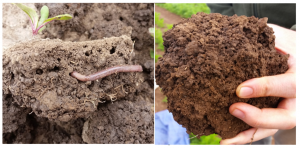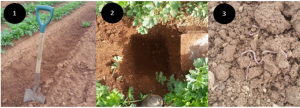Are earthworms working for you? If soils are managed well, a silent workforce of millions of earthworms can toil day and night to work and fertilise the soil on your farm. Earthworm activity aerates the soil, improving drainage and root growth. Worms can eat and excrete their body weight every day when they are active and their droppings or ‘casts’ fertilise the soil and promote root growth.
A ‘healthy’ population of 200 earthworms per square metre equates to 2 tonnes/ha/day of tillage and spreading of nutrient-rich casts. Higher populations can undertake more work. As a general rule of thumb, soil should have at least 2-4 earthworms per spade-full when soil is moist. When earthworms are working, you will see burrows and peds/casts indicating an aerated and fertilised soil.

Earthworms burrow through soil forming holes and leave behind round peds (casts), indicating an aerated and fertilised soil (Photo: Bill Brant, Blue Environment Pty Ltd)
Advantage of working with earthworms
- Reduced input costs
- Fuel, equipment and labour
- Farm chemicals
- Fertiliser
- Potential yield and quality gains, particularly when soils are initially poor and climate conditions are more extreme
- Sustainable soil health
Opportunities in orchards
The following practices increase earthworm activity:
- Reduced/no tillage when establishing orchards and maintaining areas between row.
- Cover crops/pasture and green manures. Maintaining healthy plants between trees will feed the bacteria and fungi and provide the decaying organic matter that earthworms feed on.
- Maintaining/managing soil moisture. Earthworms can ‘hibernate’ for up to several months of dry conditions but maintaining moisture will keep them active for longer periods.
- Use integrated pest management practices and farm chemicals that are less toxic to earthworms. Soil fumigants and nematicides, many fungicides and insecticides and some herbicides are toxic to earthworms or the soil fungi and bacteria they feed on.
Orchardists could also use vermi-cast bio-fertilisers and extracts from worm farms to feed low-performing soils. They could establish their own worm farms fed by organic waste from the farm or buy commercial vermi-cast products. Some grazing properties use vermi-casts containing compost worm ‘eggs’ to help break down manures and slashed green manures.
Looking for earthworms

- Use a garden spade in areas that have not been cultivated in a least two to three months and have had good soil moisture down the profile during that period. In the warmer months do this in early to mid morning before the temperature gets above 25 degreesC.
- Randomly pick a sample point. Use the spade to measure and cut out a spade sized sod of approximately 15cm x 15cm wide x 30 – 40cm deep (i.e. the width and depth of most spade blades). Do this as quickly as possible – earthworms will retreat down the soil profile when they sense digging.
- Place the sod on the ground or on a tarp and sort through it by hand. Extract and count adult and non-adult earthworms. Adult earthworms are typically larger and have a distinct collar or ‘saddle’. If the earthworm population is healthy, there will be an average of at least two to four larger earthworms per spade-sized sod. You might not find this number in every sample, but you should find it in most. Repeat the sampling and worm counts at least 5-10 other sampling points to get a feel for the average number.
Earthworm Facts
- Earth working earthworms can take more than 90-100 days to double their numbers under good conditions
- Conventional tillage and fumigation use can reduce numbers by up to 80-90%, and it takes over a year to get back to original numbers
- Earthworms feed on decaying organic matter, bacteria, fungi and other micro-organisms (including disease /pest organisms). They are a good indicator that soil biology is healthy.
- They are not the same as ‘nematodes’. Earthworms do not attack living roots or plants. But nematicides (and many fungicides and some insecticides) will kill them and their food chain.
- Earthworms also produce calcium carbonate, which improves soil structure.
- They also produce chemicals that promote root growth.
- Research trials have shown green manures and cover crops feed earthworms and increase their numbers. Keeping a year- round ground cover in an orchard will boost earthworm activity.
Vermi-casts and teas
- Excretion or ‘casts’ contain concentrated and plant-available nutrients, as well as containing plant growth hormones/stimulants.
- Liquid extracts and ‘teas’ have been shown to have positive effect on soil and plant health, and in some instances have been used as foliar sprays to suppress fungal and bacterial disease. However, there are no standards for commercial vermiculture products and it is important to look for suppliers that can provide evidence of good quality control and can provide product testing information.
Farm Chemicals
If most soil conditions are favourable for earthworms and chemicals are used according to label advice, then earthworm activity levels will generally survive/recover from farm chemicals, it may just be a matter of time.
Higher impact

Lower impact
Degree of impact of farm chemicals on earthworms
–Nematicides and soil fumigants
–Fungicides (mostly kill earthworms and worm food)
–Insecticides (most will have some impact on worm activity)
–Some ‘Certified Organic’ products are more toxic than some synthetics
–Some herbicides (but if these reduce tillage and build organics matter they can also help earthworm numbers)
–Fertilisers generally have a positive overall effect on earthworm activity
Although they are not common in Victoria, look for evidence of deep-dwelling earthworms that deeply aerate and fertiliser soil down to depths of more than 2 metres. Look for piles of casts at the surface and deep vertical burrows. It may be possible to introduce deep burrowing earthworms from other farms. They have been found in south west Victoria and the Ovens Valley, and are common in Tasmania.
OzApplePear IPDM thanks Bill Grant for this article and all images.
Bill Grant is an environmental consultant for Blue Environment Pty Ltd and has conducted research for HIA in Earthworms. For further information contact Bill on 0407 882 070 or [email protected]
Article reviewed by David Williams (Agriculture Victoria)
